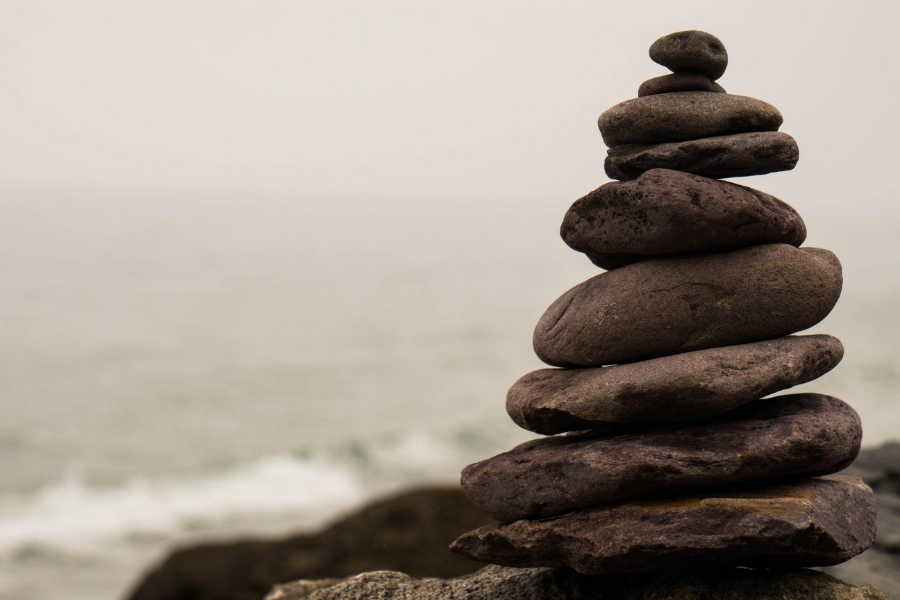Slowing down, taking time for yourself, winding down, paying attention to yourself - there are many different descriptions for mindfulness. Mindfulness describes a state of clarity and clear awareness in which all moments are experienced free of prejudice and judgment.
This leads to a reduction in stress levels, negative feelings disappear more quickly and it increases the production of serotonin, the human happiness hormone. There is also medical evidence of a connection between increased mindfulness and the well-being of individuals. Mindfulness helps with sleep disorders and tension pain and lowers blood pressure. Mindfulness is worth it! :)

What did mindfulness mean?
The concepts of mindfulness and meditation originally come from Buddhism and are closely linked. During meditation, we create a distance between ourselves and our feelings and thoughts. In the long term, this distance leads to more joy and satisfaction. In the late 1970s, the molecular biologist Jon Kabat-Zinn developed the medical mindfulness training MBSR (Mindfulness-Based Stress Reduction). This stress management through mindfulness is now part of new behavioral therapy methods and is also used in many clinics. It was important to him to also help people without a spiritual connection. Breathing techniques, yoga postures and meditation play a major role here.
Many people's thoughts are elsewhere, especially in the stressful time before Christmas - just not in the here and now. How many presents do I have to buy before December 24th? Where am I going to spend the holidays? What's there to eat? In other words, the exact opposite of mindfulness: Mindfulness means experiencing the moment without judging it or worrying about the future. We want to bring a little peace and quiet to the stressful time before Christmas and calm down a bit.
10 tips for more mindfulness in everyday life
We have collected 10 tips for more mindfulness that you can easily integrate into your everyday life.
1. Proper breathing
It's about breathing in and out deeply and consciously. Focus on each individual breath and you'll see that your thoughts will stop spinning all by themselves.
2. Meditate
Meditation means embarking on a journey into our innermost self, becoming aware of what is important and where we want to go.



3. Movement
Regular exercise is good for the body and mind. We are told this from a young age, but in our stressful everyday lives we often neglect it. If we do find the time, we go to the gym or go for a quick jog. Why don't we try to integrate exercise into our everyday lives and consciously take every step of the stairs to our home or office? Another great tip is to be mindful when walking: take each step consciously, without dwelling on a particular thought.
4. Nutrition
Because good food makes you happy, and a balanced diet leads to greater well-being. Take your time with your meals and concentrate on every bite. Also make sure you drink enough water.
5. Attentive action
Try to do one activity a day with complete mindfulness. Focus on small, seemingly inconspicuous household tasks, like vacuuming or folding laundry. Take the time you need and focus on each individual movement.
6. Digital Detox
Consciously avoiding media and the flood of information it produces, especially the various social media channels, but also TV and radio, can create new space for relaxation and creativity in everyday life. Many smartphones also have a limit that you can set for the use of various apps - we can say from our own experience that it helps!
7. Write a diary
Write down your thoughts, successes or problems in a diary every morning or evening. This will help you sort out your needs and focus on what is important.
8. Listen to your favorite song
Try to put on your favorite song or playlist once a day. Good music puts you in a good mood and dancing gets you moving and shakes off all your worries and problems :)
9. Time with friends and family
Mindfulness doesn't always have to be practiced alone. Take time to meet with your loved ones and have good conversations or just be silent together.
10. Practice gratitude and self-love
Every day, be aware of what you are grateful for today. You can also combine this with your diary entries.
With these tips, you can bring a bit of mindfulness back into your life. Treat yourself to this little break in the stressful time before Christmas!






